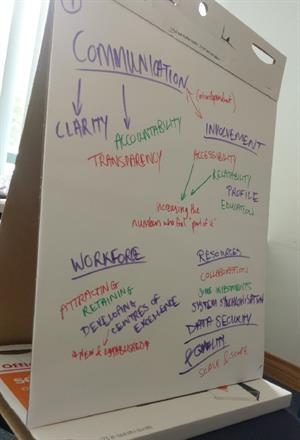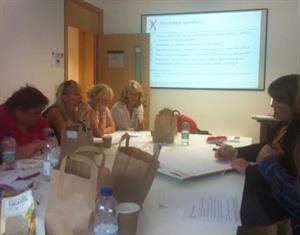Last week Eve attended a patient group workshop organised by Genetic Alliance UK, which aimed to understand the patient perspective on important issues affecting rare disease patients in Wales. This week’s blog highlights the key discussions taken from the workshop.Last Tuesday I travelled to Cardiff to attend a patient workshop designed to address key issues affecting rare disease patients living in Wales. There were a mixture of patients, patient representatives and patient-group representatives in attendance, all coming with the same goal: to improve the lives of rare disease patients living in Wales.The first part of the workshop focused on genomics, an area that has seen major advances in recent years. We heard from Angharad Kerr, Senior Policy Manager of the Welsh Government. Angharad is heavily involved in developing the
genomics strategy in Wales, intended to advance our understanding of genomics with the potential to revolutionise medicine and public health. The strategy will enable a move towards much more personalised healthcare. Angharad briefly outlined the project and it was really encouraging to see that patient engagement would play a crucial part in developing the strategy.
The group discussion that followed acknowledged challenges and identified key priorities. The flat line budget and high cost of precision medicine was noted as a significant concern. We also discussed the difficulties
for workforces in Wales, with staff retention recognised as another challenge. Wales continues to create increasing numbers of centres of excellence in rare diseases. Promoting and raising awareness of these major developments could be influential in encouraging more people to train and stay in Wales.
The group discussion was important in addressing the needs of patients involved in genomic testing. One key priority for the patients was the importance of effective communication. Giving patients more informationabout what the project will involve and why it is necessary increases their understanding and confidence in the whole process. Another factor discussed was the importance of involving patients in decision making. As stated so often with rare diseases, it is the patient who is the expert in their condition. This makes it even more important to give these patients a voice, empowering them to take an active role in their care.The second part of the workshop focused on the formation of a
Cross Party Group (CPG) for rare, genetic and undiagnosed conditions in Wales. The CPG will form to discuss a broad range of issues affecting rare disease patients in Wales, with coordinated care, early diagnosis and access to specialists among just some of the topics discussed by the group. We also discussed potential candidates for the role of chair and identified potential assembly members to join the CPG.
The group discussed the importance of making the CPG an open group, meaning that anyone is able to attend the meetings. The open group nature encourages patients to attend and share their stories, providing a powerful catalyst for change. Finally we decided on a launch day for the CPG: Rare Disease Day 2017.


The meeting really encouraged open-natured discussions, addressing key challenges and pushing for much-needed improvements to rare disease services in Wales. Involving patients in the future of our healthcare is fundamental and the patient group workshop played an important part in this process.Are you a rare disease patient living in Wales? Want to be involved in the CPG, suggest assembly members to join or share your experience of living with a rare disease in Wales? Email
eve@akusociety.org to find out more.
